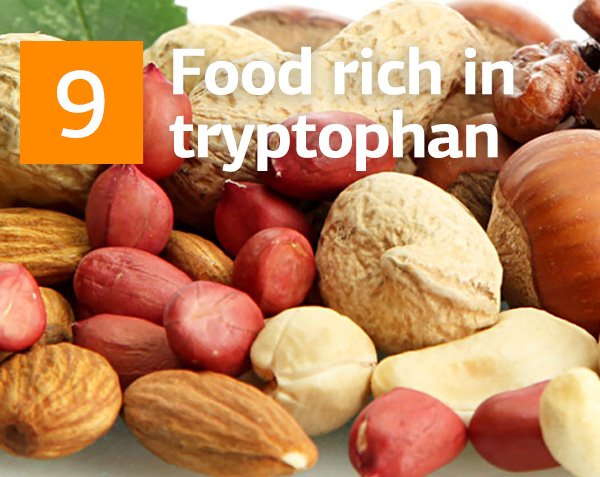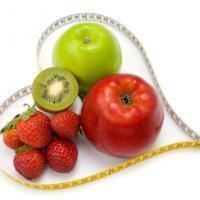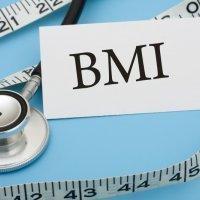Tryptophan and Foods High in Tryptophan
In order to maintain healthy lifestyle, apart from keeping a balance of carbs, fats and proteins, every human needs to regularly consume other important nutrients – vitamins, minerals and amino acids. The latter, despite their small size, have a leading part in many body processes. One of the most important amino acids is tryptophan.
But before we even start to talk about it, let's mention another important element – serotonin – the so-called "hormone of happiness". As it can be easily deduced from its name, the serotonin hormone mainly serves to produce stable good mood and healthy sleep. Simply put, it creates the feeling of emotional well-being. An insufficient quantity of serotonin in blood results in anxiety, insomnia, attention disorders, hyperactivity, migraine, headaches and tension. That's why doctors prescribe medicines, which contain this hormone, to people who suffer from depression and mood shifts.
Fortunately, human body can produce a sufficient amount of serotonin by itself. However, in order to perform this process, it needs an indispensable amino acid – tryptophan. The synthesis of serotonin from tryptophan takes place in the conarium, literally in the brain!
Tryptophan isn't only the semi-product of serotonin – it's a significant element in its own right. The fair amount of tryptophan in the organism helps to eliminate emotional stress, aggressiveness, fights migraines and even aids to overcome alcoholism. Tryptophan facilitates rehabilitation after alcohol and nicotine poisonings. This almighty amino acid is very important for overweight people – it normalizes appetite and reduces the feeling of hunger. It also decreases the urge to eat products high in carbohydrates (especially sweets and pastry). That’s why products containing tryptophan are used in treatment of obesity and eating disorders – anorexia and bulimia.
Unlike the plants, fungi and microorganisms, humans cannot synthesize tryptophan – we can only get it from food. The recommended daily intake of this amino acid is four milligrams per one kilo of body weight. This way, a person weighing 70 kilos needs roughly 280mg of tryptophan daily. In order to sleep better, make sure at least half of your daily tryptophan intake happens in the second part of the day.
The quantity of tryptophan in nutrition is not the only thing of importance. In order to make sure this nutrient is digested correctly, you need to create the right food combinations. Amino acids “compete” with one another. Their digestion is facilitated by vitamins, minerals and other elements. In order to be fully consumed, tryptophan needs helpers – carbohydrates, vitamins of group B, magnesium and zinc. If these elements are absent in your body, it will be hard for tryptophan to get to your brain and start the synthesis of serotonin. The optimal product is beef liver – it contains iron and vitamins of group B, needed to provide complete absorption of tryptophan.
Other most tryptophan-rich foods include:
1. Seeds and Nuts
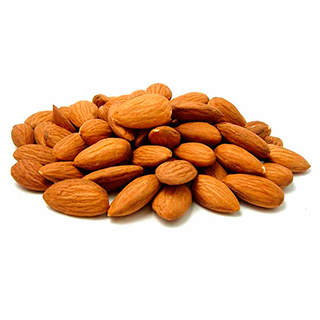
| Nuts, almonds, blanched | |
| 100 g | 1 cup whole kernels (145 g) |
| Tryptophan: 287 mg (103% DV) |
Tryptophan: 416 mg (149% DV) |
Seeds and nuts, especially pumpkin seeds. If you want a chewy snack to replace unhealthy potato chips, choose them! Pumpkin seeds are also a natural sedative. Eat a little of pumpkin seeds a several hours before you get to bed (along with a bit of healthy carbohydrate, like fruit), and this will help you fall asleep quicker and sleep more soundly.
2. Soya foods
.jpg)
| Soy meal, defatted | |
| 100 g | 1 cup (122 g) |
| Tryptophan: 653 mg (233% DV) |
Tryptophan: 797 mg (285% DV) |
Soya foods. They've gained their popularity for being a perfect vegetarian replacement for meat. Nevertheless, all people, even those who eat meat regularly, are recommended to turn their attention to soya products. The highest tryptophan ratio is contained in the roasted soybeans; the single serving of them will fully cover an average daily need of tryptophan. Beans, which are known to be a fine source of vegetarian protein and a nutritional powerhouse, contain a big amount of tryptophan as well!
3. Cheese

| Cheese, cheddar | |
| 100 g | 1 cup, diced (132 g) |
| Tryptophan: 320 mg (114% DV) |
Tryptophan: 422 mg (150% DV) |
Cheese is another savory product, which will definitely make you feel calmer and happier! If you want to maximize the tryptophan digestion, eat cheese with a loaf of bread. It contains glucose, which will help tryptophan to digest better. A portion of roughly 50 grams of cheese will be enough to cover the whole daily need of tryptophan. But remember not to eat too much cheese, because it has a very high calorific and fat value.
4. Animal products
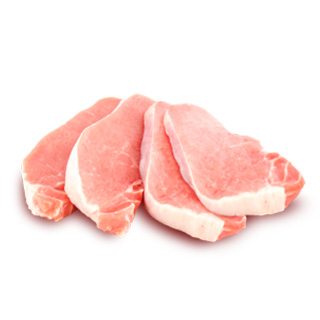
| Lamb, australian, fresh, composite of trimmed retail cuts, separable lean only | |
| 100 g | 1 lb (454 g) |
| Tryptophan: 236 mg (135% DV) |
Tryptophan: 1071 mg (383% DV) |
Animal products should be regularly present on your dinner table. Lamb, beef, pork as well as turkey and chicken, literally every kind of meat may serve as a perfect source of tryptophan. The excessive consumption of animal products causes slumberous feeling. It’s believed, that this effect is connected with high concentration of tryptophan in these products. Such belief is wrong, because animal products have roughly the same amount of tryptophan as the other products. Anyway, don't eat too much meat if you want to stay awake and alert after your dinner!
5. Shellfish
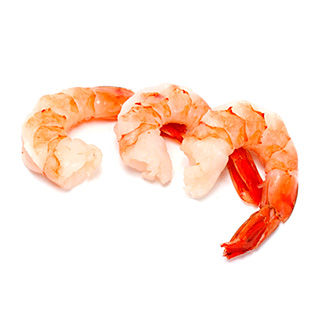
| Crustaceans, shrimp, mixed species | |
| 100 g | 1 medium (6 g) |
| Tryptophan: 283 mg (101% DV) |
Tryptophan: 17 mg (6% DV) |
Such gourmet product as shellfish is a natural multivitamin complex, which also contains tryptophan. Apart from that, shellfish increases the general tonicity of human body. This product is especially beneficial for the female body, especially in climacteric period.
6. Oatmeal

| Cereals, oats, instant, fortified, plain, dry | |
| 100 g | 1 packet (28 g) |
| Tryptophan: 180 mg (64% DV) |
Tryptophan: 50 mg (18% DV) |
A typical British breakfast choice, oatmeal porridge, contains enough tryptophan to get you through the day full of stress. It also contains a lot of healthy "slow" carbohydrates and fiber, which will keep you energetic and full for a long time! Add whole eggs to a plate of oatmeal porridge and you will receive a perfect healthy and light breakfast, full of tryptophan! Yes, eggs are also a good source of it!
7. Vegetables and Fruits
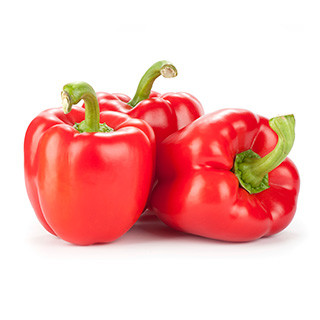
| Peppers, sweet, red | |
| 100 g | 1 medium (approx 2-3/4 inch long, 2-1/2 dia.) (119 g) |
| Tryptophan: 12 mg (4% DV) |
Tryptophan: 15 mg (5% DV) |
Vegetables and fruits will boost your mood in two ways – first, by pleasing the eye by their bright colors, second – by bringing the tryptophan into your body. The brighter they are – the better. Include eggplants, zucchini, sweet pepper, beet and carrots to your menu daily. To make most out of them, try to reduce cooking as much as possible. Eat raw veggies and fruit! This will keep you fresh, alert and exhilarated.
8. Milk

| Milk, whole, 3.25% milkfat, with added vitamin d | |
| 100 g | 1 cup (244 g) |
| Tryptophan: 75 mg (27% DV) |
Tryptophan: 183 mg (65% DV) |
According to a popular belief, a cup of milk before bed helps to sleep tighter. This effect really takes place and is explained by the high concentration of tryptophan in milk. So, if you suffer from insomnia, a cup of warm milk may fix this!
